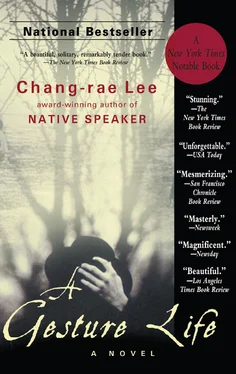“I don’t think I am brave.”
“You are.” She sat up on her knees. “I don’t know what risks you’re taking by being kind to me. But I know you are taking risks. What would the captain have done if he had found us in the other room yesterday or the day before that, sitting and talking as we were? What would he have done then?”
I couldn’t say what would have occurred. I still couldn’t imagine myself challenging him, or being insubordinate in any way, and yet the thought of accepting whatever punishment he deemed deserving for me, and especially for her, seemed equally impossible. In the last few days I had begun to find myself defending her, at least in my mind, stepping between her and others, or pulling her from some faceless danger. But in truth it was solely the doctor and surgeon, Captain Ono, who ever had any purpose and intention for her, who even knew, besides myself, where K was, and it was his narrowed, severe visage that I could not yet conceive of repelling.
“I want to help you,” I said to her. “But I can only do for you what I have done already, and nothing more. I have tried to keep you in a state of healthfulness, which is my responsibility, and the captain would ultimately understand that, I believe.”
She shook her head. “You don’t have to speak like that, Jiro. I know you don’t believe only what you say. You’re not just being a dutiful medical officer. I thought we had talked yesterday about what might happen after the war. What your hopes and plans were, to go to medical school and become a respected physician in Kobe. And then meeting a nice girl from a good family and having many children, all of you in a fine house with beautiful grounds. I enjoyed talking like that, about what the future would hold. Didn’t you?”
“Yes,” I answered.
“And remember what you said? How we could perhaps meet again, in an interesting place like Hong Kong, or Kyoto. What fun times we might have, seeing the sights together. We were just talking, I know, but sometimes that’s enough to make everything seem real.”
“I would like it to be real,” I said, recalling the serene temples I had described to her, the ones in Kyoto I had visited on school trips, the plum trees blooming about their hilltop perches in fantastical color. “I stayed awake until almost morning, thinking of other places you might like to see.”
“What were they?”
“I thought of the rocky seasides on Shikoku, the steep cliffs above the water, the humble fishing villages there. Because you said you liked the water, and swimming. And then of course there is Tokyo, which I have not yet been to, but which must be wondrous in all its activity. They say it is a hundred Kobes, put all together.”
“My father was there once,” she said, surprising me. “When I was eight or nine. He brought back a fancy set of brushes for us girls to share, and brand-new English lesson books for our brother. For my mother he brought a tiny chest filled with European face powder and perfume and lip pencils.”
“Why was he there?” I asked.
“He was a kind of ambassador, I think. My mother told us that a number of noblemen and civic leaders were going to Japan, to have discussions on the issue of the Japanese colonists coming to Korea. They were trying to come to an agreement, of sorts, to make it better for everyone, and fairer for those who were being displaced from their homes and shops. I remember how pleased my father was when he returned, as pleased as I have ever seen him, even taking us girls to be photographed the next day, with our mother. But by the end of the year he was most disillusioned. Nothing had changed. In fact there were more settlers than ever. And in town people began to blame my father, as he was the local official who had gone on the mission. One night we came home from a farmers’ festival to find our house burning down. We had to leave our land and move into a house-for-let, and soon after that he hardly spoke to anyone. Even our brother. He just stayed in his room of books, reading Chinese poetry and practicing his calligraphy.”
“You never mentioned what kind of family you were from.”
“Would it have made a difference in anything?”
I shook my head, knowing that it would not have. But nonetheless it explained her speech, her education, what I was finally understanding to be her class, which I hadn’t quite fathomed until then, having had no contact with such Koreans. In fact she had poked fun at my own talk, which was to her rough and slangy and of the streets, the twisty, cramped ghetto alleys of Kobe. And it seemed incongruous, as well, how it was that I, the only child of a hide tanner and a rag maid, should come to wear a second lieutenant’s uniform of the Ocean Sky Battalion of the Imperial Forces, and that she, born into a noble, scholarly house (if perhaps one fallen), would have to sleep in a surplus closet of a far-flung military outpost, her sister already dead and buried, wishing upon herself the same horrid end.
“I want to believe that you and I will do all the things we spoke of,” I told her. “I am hoping the war will end soon, as has been rumored, and perhaps much sooner than anyone knows. It is said the war in fact has been going very badly. There is even talk the Americans will soon attempt to invade Japan itself. No one will say it, but the end is likely coming, and an accommodation will be made. It must. Perhaps it will be next month, or next week even. Then we can go out of this place, we can go out of this place together, and I will take care of you and protect you no matter where we go.”
“But you say he is coming tonight,” she said sharply. “The doctor will come here tonight. Tonight! Will the war end before then? This afternoon? Will you spirit us away before the dusk falls, Jiro? Because if not there is nothing more to talk about in a real way. There is dreaming and dreaming talk and little else, which is happy enough, and maybe all that remains to us. But please don’t try to make things sound real anymore. It makes me feel desperate and mad. You’re a decent man, Jiro, more decent than you even know, so please. You can pretend, if you wish, and I’ll pretend with you, as much as I am able. But I ask you please no more than that.”
She became weary all of a sudden, and let her arms fold beneath her as she lay on her side on the meager blanket. The crown of her head was almost touching my knee where I sat beside her, and after a moment I reached out and began stroking her hair. She had let me do this before and she did not mind now. Her hair was unwashed and heavy and unsweetly redolent but to me it was a perfect mane. Two nights before I had done the same when she grew tired and lay down, stroking her gently at first but then more vigorously and deeply, running my fingers down to her soft scalp, until my hands were warmed and smooth with her oil. She fell asleep and I went to my tent and could not sleep myself, the rich, bodily smell wafting over me. I held up my hands as I lay on my bedroll, and before I knew it I had tasted and kissed them and rubbed them on my face and neck and elsewhere, and in the morning I wanted to be with her like nothing I had ever known. But on sight of the closet door I had to retreat and scrub my hands in the exam room, ashamed by the feeling that I had secretly profaned her.
But now she closed her eyes as I stroked. She had told me she was no longer sleeping much at night or any other time, hardly shutting her eyes even a few minutes a day. She wanted to fall asleep but could not. But I thought now she was very near it, her breathing steady and rhythmical, and it seemed with each pass of my hand through her hair her exhalations grew longer and lighter. It had been many years since I had watched a woman sleep; the last time was when I lived with my first parents in Kobe, where we slept all together in a one-room house. My mother and father would be heaped in the corner like a mound of sackcloths, the noise of their exhausted slumber keeping me awake, my mother tittering in her dreams. Some mornings her pants bottom was pulled half-down, her long straight hair fallen down into the corners of her gaping mouth, my father’s hand clutching her breast. I remembered wanting to brush the loose strands away from her mouth, to cover her nakedness with the blanket.
Читать дальше











![William Frith - John Leech, His Life and Work. Vol. 1 [of 2]](/books/747171/william-frith-john-leech-his-life-and-work-vol-thumb.webp)
![William Frith - John Leech, His Life and Work, Vol. 2 [of 2]](/books/748201/william-frith-john-leech-his-life-and-work-vol-thumb.webp)